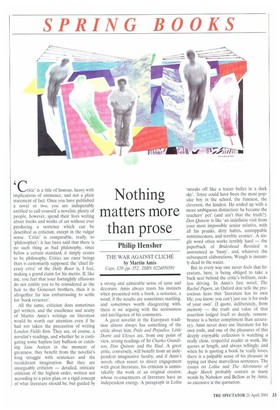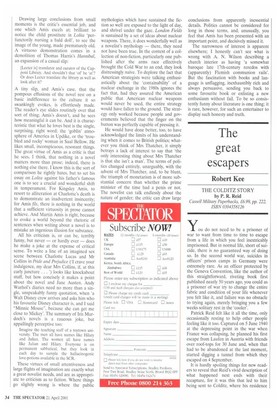Nothing matters more than prose
Philip Hensher
THE WAR AGAINST CLICHÉ by Martin Antis Cape, £20 ,pp. 352 ISBN 0224050591 Critic' is a title of honour, heavy with implications of eminence, and not a plain statement of fact. Once you have published a novel or two, you are indisputably entitled to call yourself a novelist; plenty of people, however, spend their lives writing about books and works of art without ever producing a sentence which can be described as criticism, except in the vulgar sense. 'Critic' is comparable, really, to 'philosopher'; it has been said that there is no such thing as bad philosophy, since below a certain standard, it simply ceases to be philosophy. Critics are rarer beings than is customarily supposed; the `chief literal), critic' of the Daily Beast is, I feel, making a grand claim for his merits. If, like me, you feel that your fortnightly effusions do not entitle you to be considered as the heir to the Goncourt brothers, then it is altogether far less embarrassing to settle for 'book reviewer'.
All the same, criticism does sometimes get written, and the excellence and acuity of Martin Amis's writings on literature would be worth our attention even if he had not taken the precaution of writing London Fields first. They are, of course, a novelist's readings, and whether he is castigating some hapless lazy buffoon or catching Jane Austen in the moment of greatness, they benefit from the novelist's long struggle with sentences and the recalcitrant imagination. But they are unarguably criticism — detailed, intricate criticism of the highest order, written not according to a prior plan, or a rigid concept of what literature should be, but guided by
a strong and admirable sense of taste and decorum. Amis always trusts his instincts when presented with a book, a sentence, a word; if the results are sometimes startling, and sometimes worth disagreeing with, there is no arguing with the seriousness and intelligence of his comments.
A great novelist in the European tradition almost always has something of the critic about him: Pride and Prejudice, Little Dorrit and Ulysses are, from one point of view, strong readings of Sir Charles Grandison, Don Quixote and the Iliad. A great critic, conversely, will benefit from an independent imaginative faculty, and if Amis's novels often resort to direct engagement with great literature, his criticism is unmistakably the work of an original creator, whose re-enactments of literature have an independent energy. A paragraph in Lolita `streaks off like a tracer bullet in a dark sky'. 'Joyce could have been the most popular boy in the school, the funniest, the cleverest, the kindest. He ended up with a more ambiguous distinction: he became the teachers' pet' (and ain't that the truth?). Don Quixote is like 'an indefinite visit from your most impossible senior relative, with all his pranks, dirty habits, unstoppable reminiscences, and terrible cronies'. A single word often works terribly hard — the paperback of Brideshead Revisited is announced as 'busty', and, whatever the subsequent elaborations, Waugh is instantly dead in the water.
But in every way one never feels that literature, here, is being obliged to take a back seat behind the critic's brilliant, reckless driving. In Amis's first novel, The Rachel Papers, an Oxford don tells the precocious hero that 'literature has its own life, you know: you can't just use it for ends of your own'. (I quote, deliberately, from memory — the truth and value of that assertion lodged itself so deeply, remembrance is a better compliment than accuracy). Amis never does use literature for his own ends, and one of the pleasures of this deeply enjoyable collection is watching a really close, respectful reader at work. He quotes at length, and always tellingly; and when he is quoting a book he really loves, there is a palpable sense of his pleasure in typing out these marvellous sentences. The essays on Lolita and The Adventures of Augie March probably contain as many words by Nabokov and Bellow as by Amis, so extensive is the quotation. Drawing large conclusions from small moments is the critic's essential job, and one which Amis excels at; brilliant to notice the child prostitute in Lolita 'perfunctorily nursing a bald doll', to see the image of the young, made prematurely old. A virtuoso demonstration comes in a demolition of Thomas Harris's Hannibal, an expansion of a casual slip: [Lecter is] translator and curator of the Capponi Library. And shouldn't that 'of be 'at'? Or does Lecter translate the library as well as look after it?
A tiny slip, and Amis's case, that the pompous effusions of the novel rest on a basic indifference to the culture it so swankingly evokes, is effortlessly made. The reader's eye slides routinely over that sort of thing; Amis's doesn't, and he sees how meaningful it can be. And it is characteristic that what he loves best is the single, surprising, right word; the 'goblin' atmosphere of America in Updike, or the 'troubled and rocky' woman in Saul Bellow. He likes small, inconspicuous, resonant things. The great virtue of Amis as a critic is that he sees, I think, that nothing in a novel matters more than prose; indeed, there is nothing else there. I know this is the sort of comparison he rightly hates, but to set his essay on Lolita against his father's famous one is to see a crucial and wonderful shift in temperament. For Kingsley Amis, to resort to alliteration at Charlotte's death is to demonstrate an inadvertent insincerity; for Amis fiis, there is nothing in the world that a sufficient virtuosity in prose cannot achieve. And Martin Amis is right, because to evoke a world beyond the rhetoric of sentences when writing about a novel is to mistake an ingenious illusion for substance.
All his criticism is, or can be, terribly funny, but never — or hardly ever — does he make a joke at the expense of critical sense. To write a line of an imagined sex scene between Charlotte Lucas and Mr Collins in Pride and Prejudice CI crave your indulgence, my dear Mrs Collins, if, at this early juncture . . . ') looks like knockabout stuff, but how concisely it makes a point about the novel and Jane Austen. Andy Warhol's diaries need no more than a single, unspeakably funny quotation, when 'a Walt Disney crew arrives and asks him who his favourite Disney character is, and I said "Minnie Mouse", because she can get me close to Mickey'. The summary of Iris Murdoch's novels is a raucous joke, but appallingly perceptive too; Imagine the teaching staff of a toytown university. The men all have names like Hilary and Julian. The women all have names like Julian and Hilary. Everyone is on permanent sabbatical, but they look in each day to sample the hallucinogenic love-potions available in the SCR.
These virtues of small attentiveness and large flights of imagination are exactly what a great novelist needs, and are as appropriate to criticism as to fiction. Where things go slightly wrong is where the public
mythologies which have sustained the fiction so well are exposed to the light of day, and shrivel under the gaze. London Fields is sustained by a set of ideas about nuclear weapons. There, it does wonderfully well as a novelist's mythology — there, they need not have been true. In the context of a collection of non-fiction, particularly one published after the arms race effectively brought the Cold War to an end, they look distressingly naïve. To deplore the fact that American strategists were talking enthusiastically about the `containability' of a nuclear exchange in the 1980s ignores the fact that, had they assured the American public that American nuclear weapons would never be used, the entire strategy would have fallen to the ground. The strategy only worked because people and governments believed that the finger on the button was perfectly capable of pressing it.
He would have done better, too, to have acknowledged the limits of his understanding when it comes to British politics; whatever you think of Mrs Thatcher, it simply betrays a lack of interest to say that 'the only interesting thing about Mrs Thatcher is that she isn't a man'. The terms of politics changed entirely, unarguably, with the advent of Mrs Thatcher, and, to be blunt, the triumph of monetarism is of more substantial concern than whether the prime minister of the time had a penis or not. The novelist can talk endlessly about the nature of gender; the critic can draw large conclusions from apparently inessential details. Politics cannot be considered for long in those terms, and, unusually, you feel that Amis has been presented with an important point, and decisively missed it.
The narrowness of interest is apparent elsewhere; I honestly can't see what is wrong with A. N. Wilson describing a church interior as having 'a somewhat baroque late 17th-century reredos with (apparently) Flemish communion rails'. But the fascination with books and language is unflagging, inexhaustibly rich and always persuasive, sending you back to some favourite book or enlisting a new enthusiasm without fail. To be so consistently funny about literature is one thing; it is rare, however, for such an entertainer to display such honesty and truth.



































































 Previous page
Previous page